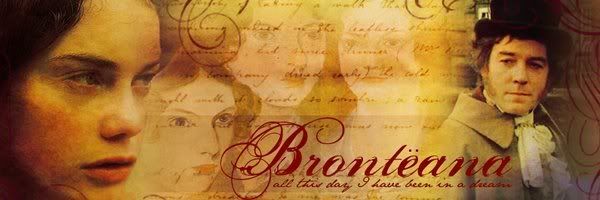Trailer for Episode Two of Jane Eyre
Thanks to Pennyforyourdreams!
I must apologise for not posting yesterday, but this little Bronte scholar is, well... working on scholarship. Annotated bibliographies wait for neither time nor bloggery. But after spending the whole of the day in this lovely library I will allow myself a moment of not reading Canadian Modernist poetry.
I have a little more news as well. On the 20th I will be taking part in a round table seminar on digital Romanticism at Dalhousie University, to talk about Bronteana and the Brontes on the internet. And in the midst of all of my other projects and hobbies, I plan on submitting a paper to a conference in North Carolina on entertainments in Victorian literature. I've long wanted to examine art songs, and such- going to see gypsys and that sort of thing... I'm a very happy grad student at the moment.
Ps. Oh, I am also aware that I'm falling behind with comments and email. Just be a patient and I'll reply to everyone.
Saturday, September 30, 2006
Thursday, September 28, 2006
Footage from Jane Eyre 2006 RT Cover Shoot
This little curiosity brought to you by Pennyforyourdreams (of course). Thanks Penny!
It's the big drama of the new season: Jane Eyre hits our screens on BBC1 from Sunday 24 September - and Radio Times was right there for the filming. The current issue of Radio Times goes behind the scenes on the lavish new production and here you can enjoy exclusive video footage of the cover shoot to accompany the interview.
The clip is available here for Windows Media Player and Real Player.
Posted by
Brontëana
at
4:52 p.m.
9
comments
![]()
Labels: interviews, jane eyre, jane eyre 2006
More Reviews and Some Intellectual Fangirling
Well, a lot of fangirling, actually. But first for the review, which follows our rule about articles about Jane Eyre having to contain a pun: An Eyre of intelligence. It is favourable, if not a little ambiguous about which 'Jane Eyre' he's talking about at times- the novel or the television series.
The challenge to which the director Susanna White and her adaptor, Sandy Welch, have chosen to rise is to make an intelligent, thinking Jane Eyre (Sundays, 9pm). To be avoided, on the one side, is the Scylla of the OTT Gothic novel: everyone knows there is a madwoman in Rochester's attic, but this adaptation reminds us that there are monsters on Jane's sketch pad, too. On the other side lies the Charybdis of a sloppy romance: Rochester, the Byronic owner of Thornfield, is the prototype for every tall, dark and smirking nob Barbara Cartland ever wrote about. But navigate between the two, and you discover the first great English Bildungsroman in which hero and heroine are given a sentimental education.
[...]
His Rochester is in love with his own suffering, in awe of his own decadence. He calls Jane a witch, but it is his own dark past that has bewitched him. Yet, as Mrs Fairfax says, the master is not without humour. Without giving him a heart of gold, Stephens lets you know that, while Rochester's instinct is to laugh at everyone, his ambition is to find someone to laugh with. In a reversal of the romantic stereotype, Rochester loves Jane because she is that someone. Asked if she finds him attractive, Jane wins a chuckle from him and us by saying "No" and then adding that he is not repellent either.
[...]
The conceit of the book is that while Rochester believes Eyre, in her sinless youth, to be in need of a sentimental education into life's horrors, it is he who ends up taught a lesson in humanity by her. His blinding - the symbolic castration that brings Jane back to him - is the creepiest moment in the book, not to mention the most absurd. I hope this magical adaptation has the sorcery to make us accept it.
And now for the fangirling from the article 'Is Jane Eyre the Sexiest Book of All Time?'
In Jane Eyre, Charlotte poured her loneliness and thwarted lust on to the page. The great and touching paradox of Jane Eyre is that if Charlotte Bronte had been loved, there would be no Mr Rochester.
But she wasn't and there is. (I must turn away from my computer now to have a Rochester-themed reverie.)
[...]
Rochester is an angel. He is a darling. He is a chocolate. And — did I mention it? — he is very, very rich.
He pouts, broods and beats his way into our hearts, riding around the moors in leather boots and furry coats, looking ripe for rescue by our Jane.
[...]
St John is a prim, sexy blond. (She probably cut a third hero, a red-head this time, from an early draft.) And, sometimes — particularly on winter Sunday afternoons — I find him more beguiling even than Rochester.
St John is a priest — a "cold hard man" he tells Jane — but he falls for Jane like an orange rolling off a fridge. She fancies him, too, watching him admire a picture of a beautiful girl and drooling: "He breathed low and fast; I stood silent."
That's two-love to lonely Miss Bronte. How spoilt she was in her head. But it's back to Rochester and his marvellous flaws, and the beautiful cry: "Reader," — say it with me — "I married him." Aaah.
That is when I collapse prostrate on the floor, like a piece of toast waiting for some Rochester-flavoured jam.
The author goes on... oh dear:
When you are lonely, sad or just plain disappointed with the man in the street, roll over and pick up Jane Eyre. With Jane Eyre and a Hobnob biscuit you need nothing else.
Romantic love is a fiction anyway, designed to numb you to the pain of childbirth. (Ask any woman married for over seven years.) So why not take the best, the ultimate, the only? Go to bed with Rochester. He's only £5.99.
Sound a lot like another article I ran across: Rochester porn:
The new BBC-series of Jane Eyre isn’t just ”fan fiction adaptation”, I think - clearly this goes under the category of “Rochester Porn”. I just invented that term, but that’s what it is.
[...]
So, what do I mean to say with all this? Do I like it? Why of course I do! It’s Rochester Porn! Rochester-porn, people. What’s not to like about that?
Posted by
Brontëana
at
3:32 p.m.
14
comments
![]()
Labels: adaptation, articles, BBC, charlotte bronte, jane eyre, jane eyre 2006
Wednesday, September 27, 2006
Sunday Telegraph Seven Magazine Article on Jane Eyre 2006
An interview with adaptor Sandy Welch. Thanks to pennyforyourdreams! Click on the image below to enlarge it.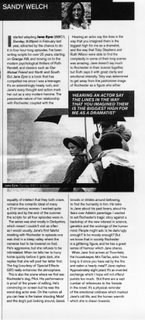
Posted by
Brontëana
at
7:30 p.m.
9
comments
![]()
Labels: articles, interviews, jane eyre, jane eyre 2006
A History Lesson for Viewers
This article is quite thorough in pointing out the Bronte associations of places near those used in the new BBC production of Jane Eyre.
The Brontë trail from the churchyard leads towards them, via scenes familiar to readers of Jane Eyre. A lane climbs through woodland to the view of Hathersage described in the novel, with the hexagonal spire of St Michael's Church rising above woods and pastures and a stream glittering elusively among them.
A footpath then passes a large house called Moorseats, standing alone on the hillside. This is generally supposed to be Moor House, to which an exhausted Jane was drawn from the moors like a moth to a flame by a light burning in a window. Eventually we reach North Lees Hall, an Elizabethan manor house that Brontë visited and that served as the inspiration for Thornfield Hall, the home of Edward Rochester.
"It was three stories high, of proportions not vast, though considerable; a gentleman's manor-house, not a nobleman's seat: battlements round the top gave it a picturesque look."
So Jane described her lover's retreat, and so it stands today. One of seven houses built by Sir Robert Eyre for his seven sons, it is now owned by the Peak Park, and is available as a holiday let.
[...]
BBC producers adjudged North Lees Hall too small for their drama, so they decamped Jane's lover to Haddon Hall near Bakewell.
[...]
Lord Edward recalls a problem that arose during an interior scene that was supposed to be taking place in spring. Unfortunately it was mid-winter, the room was freezing, and the actors had to have ice cubes in their mouths to prevent their breaths from visibly condensing in the cold air.
Posted by
Brontëana
at
7:20 p.m.
0
comments
![]()
Labels: articles, BBC, jane eyre, jane eyre 2006
Juliet Barker on Jane Eyre 2006
One of the most well-known Bronte scholars gives us her opinion on the new BBC adaptation in this article, A Breath of Fresh Eyre (it must be an inviolable law that all articles on Jane Eyre must include puns).
HERE we go again, I thought, as I watched a red sari-clad girl wandering across a desert in the opening sequence of the new BBC 1 adaptation of Jane Eyre.
Some egotistical director has decided to drag the nineteenth century orphan heroine of Charlotte Brontë's novel kicking and screaming into the modern world and make her `relevant' to today's audience.
You don't need to do this, I lectured the screen. Why can't you just do a faithful adaptation that will let the characters and the story speak for themselves?
Brontë knew what she was doing and that is why her novel remains one of the bestsellers of all time.
As it turned out, I was wrong.
[...]
He may have accused Jane of bewitching his horse and causing it to throw him, but it was Stephens himself who gave the mesmerising performance.
Stephens, who has form as a Brontë hero, having played the more instantly likeable Gilbert Markham in the 1996 television version of The Tenant Of Wildfell Hall, was surely born to play Rochester.
[...]
Ruth Wilson is a newcomer but her quietly confident performance as the adult Jane is the perfect counterbalance to Rochester's fireworks.
Posted by
Brontëana
at
7:15 p.m.
1 comments
![]()
Labels: adaptation, articles, BBC, charlotte bronte, jane eyre, jane eyre 2006
Canonising Fan Fiction
Yesterday a writer friend and I considered the relationship of literature and fan fiction, especially how they are dealt with in the Academy. Where literature ends and fan fiction begins has puzzled me for some time. I chose to write about it today because we have been discussing the new Jane Eyre mini series as Fan Fiction, and also I have been reading much on the 18th century stuggle for distinguishing 'literature' as a category. My friend and I came to a few conclusions which were not entirely satisfactory. The main distinction seems to be a legal one: if you may not publish your work for profit it is fan fiction, if you may then it is literature. We considered originality as being the arbitrating principle but that soon failed us: 'But, then Shakespeare and Virgil wrote fan fiction.' No. It seems to rely exclusively on copyright law. If that is so, would fan fiction become literature when copyright expires? (Going against the bias of the day, I do not assume fan fiction is a term of value judgement. It is evident that it is common for fan fiction to be of better quality than the original text).
The question seems relevant to me because in my reading of iterary criticism I often find myself astonished that what seem to me to be crunky fan fiction devices go undetected by academics, and in some cases are praised as strokes of genius. Anyone familiar with fan fiction will recognise the device of the 'Mary Sue' and also the tendency to be 'OOC' (out of character). The Mary Sue is a character blatantly based upon the author. This is not the same as mining autobiographical material- as Charlotte Bronte did. If Charlotte Bronte wrote a book in which a plain woman became the mistress of the Duke of Wellington, that would be a Mary Sue (especially if the woman was from Yorkshire). Imposing yourself on an existing narrative is overwhelmingly common. It gives rise to an ocean of simply bad writing, but my point is that the idea is hardly original.
And here's where I might loose my academic friends. Several novels inspired by the works of the Brontes, such as Wide Sargasso Sea, appear to fall into this category. My copy of the Norton Anthology of British Literature has a short bio of Jean Rhys in which WSS is praised for the 'brilliant imaginative act' by which Rhys turns herself into Bertha Mason. When I read this I asked myself, would I be brilliant if I made Celine Varens Canadian as I am, and gave her a backstory similar to my own experiences- I was a ballet dancer as well. My answer is no. I would be writing bad fan fiction. The work can also be seen as OOC, as neither 'Antoinette Cosway' nor her husband speak, or act in character if we assume they are Bertha Mason and Edward Rochester.
A more blatant example of Bronte fan fiction which is considered literarture is Henry Brocken (available in the sidebar). I described this work in an early post as a Bronte dream-vision. The narrator visits Ferndean during Jane's marriage to Mr Rochester and converses with her. This work lacks the Mary Sue aspect because the narrator is not usurping the role of another character in the novel. It does contain other features common to Fan Fiction: the meta-poetic dialogue. Jane Eyre speaks to the narrator, asking questions about 'what' she is. The effort is made to keep Jane in character in order to consider the impact she has had, in this case, on biotry and prejudice (Jane asks at one point if she is vain, and he says she is vain as a barrier against prejudice).
My friend and I considered why academics do not notice these hallmarks of fan fiction. We considered that fan fiction, as it exists today, can be thought of as being formalised by the 'Fanzine' culture of the 1970s. It seems likely to me that it will take some time for the form to be recognised by academics. Perhaps my generation of scholars will begin the work because 'fan fic' and 'fandom' are found everywhere in popular youth culture today.
It is not a genre, I believe, but it has definite characteristics, terminology, forms, rules, and relationships to canon. For instance, canon is not term of value judgement. Canon refers to incidents and character traits from the source material (ex. Jane leaves Rochester before the fire, Mr Rochester loves nature). A 'fic' can be written 'in canon' by carefully attempting to create an alternate narrative which can co-exist with the original. The opposite form is the 'A/U Fic' which refers to 'Alternative Universe.' In such a form, you could speculate on Jane not leaving Mr Rochester, or Rochester despising anything natural. To violate canon outside of the form of the A/U fic is a fault in style. A/U fics are generally easier to execute because there are few rules, although in the case of fics written while a series of books is being published 'in canon' works inevitable become A/U.
I am very eager to hear my reader's views on these speculations.
Posted by
Brontëana
at
11:13 a.m.
8
comments
![]()
Labels: charlotte bronte, jane eyre, jane eyre 2006
Tuesday, September 26, 2006
Mr Eshton, B. S.?
This from Coldwindtovalhalla:
There's a preview of Jane Eyre in my T.V. mag, and there's a small caption about Aidan's role - this is what's written: Jane meets the dashing scientist at a party. He is studying the psychology of twins and how they can communicate.
I think we have entered fan fiction territory. We will have much to discuss next week, n'est pas my friends?
A reminder for anyone who's memory is a little foggy: there is a Mr Eshton in the novel but he's completely incidental. He's an older man, a magistrate in the vicinity of Thornfield and he brings his family with the Ingrams and Lynns to visit. That's ALL. So... anything can happen, really.
When I did get to see the first episode my impression was that it felt a lot like fanfiction when it was good. Since good Bronte fan fiction is ...nigh impossible to find, this is a good thing. I think. We'll see.
Posted by
Brontëana
at
6:11 p.m.
14
comments
![]()
Labels: jane eyre, jane eyre 2006
Monday, September 25, 2006
More Screencaps from Jane Eyre 2006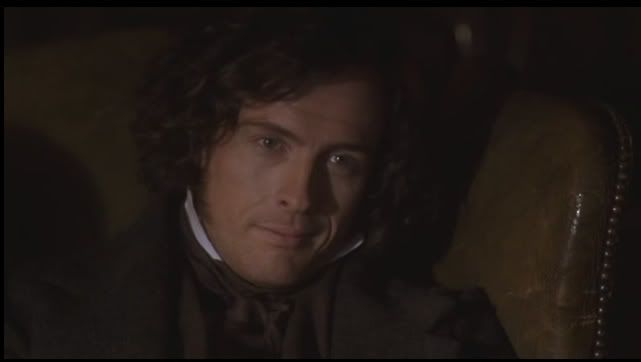
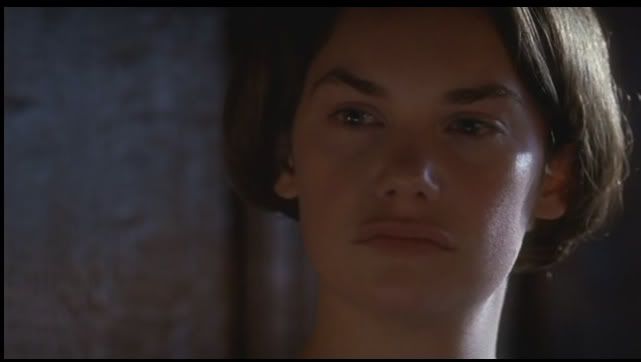
Here's some hot botanist Rochester action!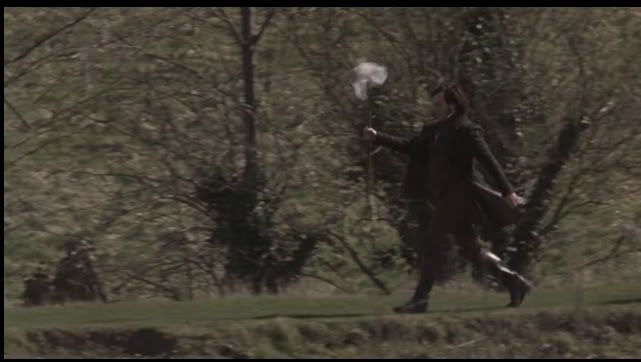
'The carriage scene' sans carriage, engagements, rings, and fairies.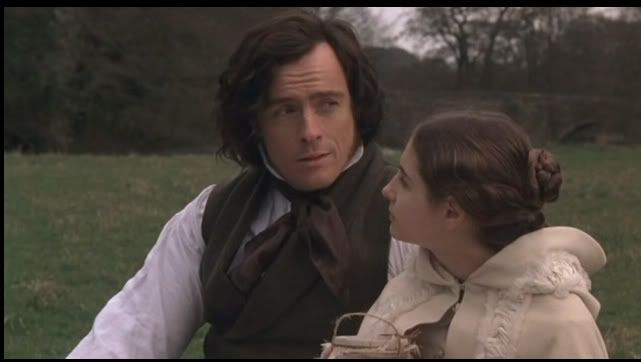
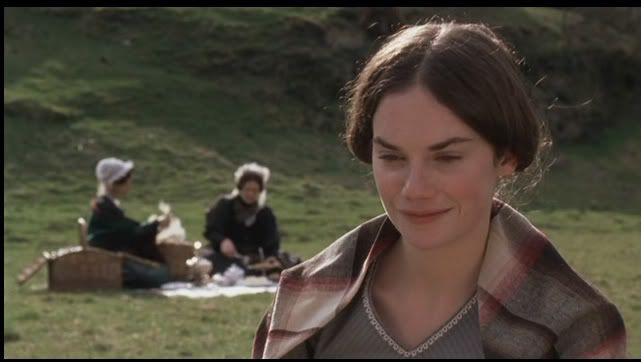
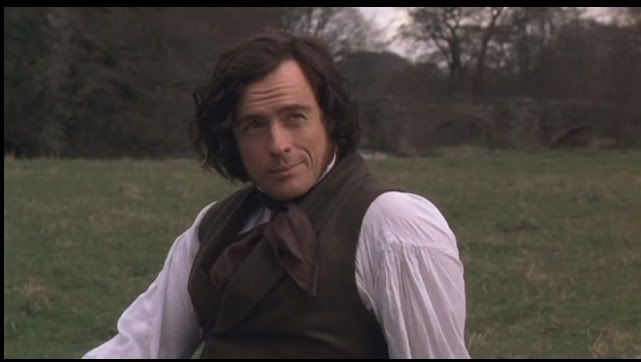
Jane hears a horrifying scratching at her door...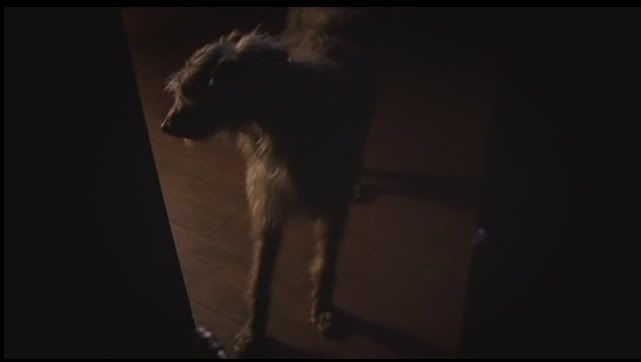
Flashback! Paris, 1820s.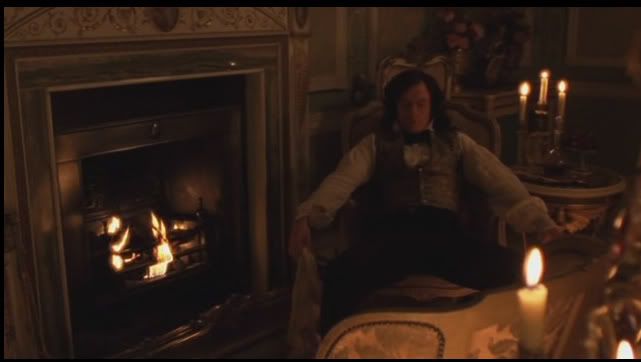
He blows his nose on Celine's shawl. She won't notice. She has dozens of them.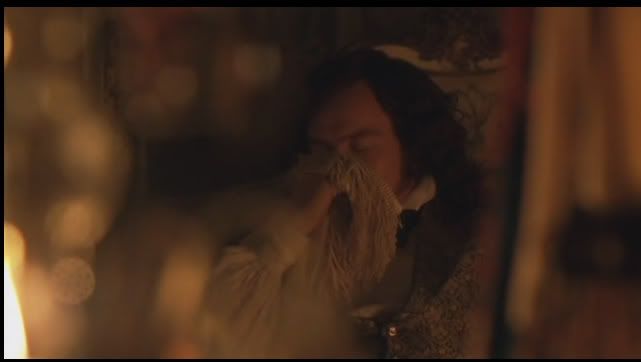
Betrayal! No bon bons or biscuits!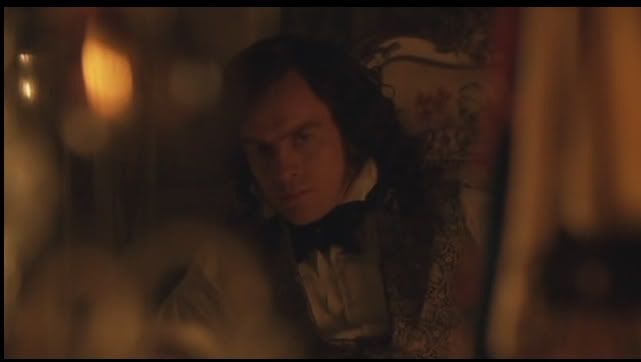
Oh, and Celine has a lover: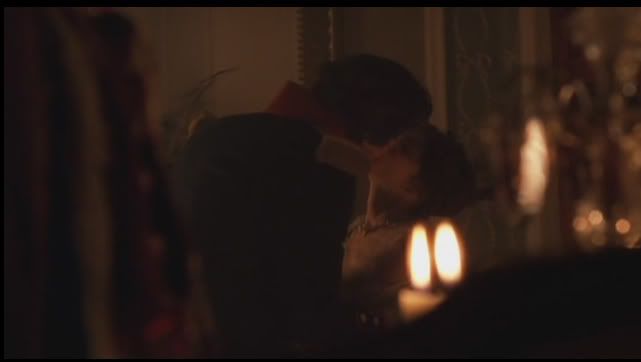
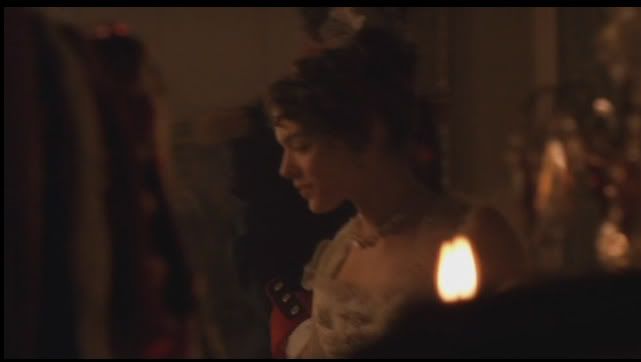
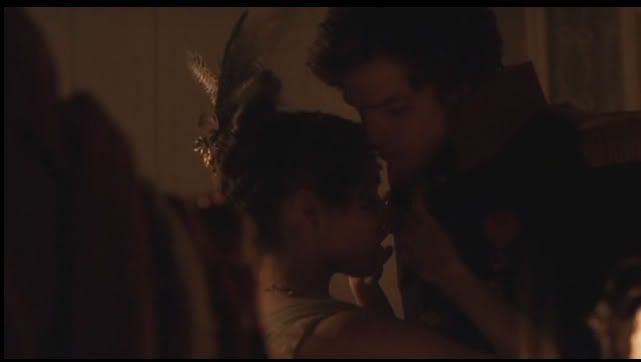
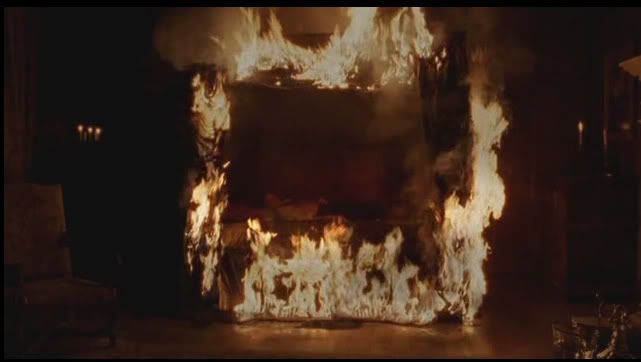
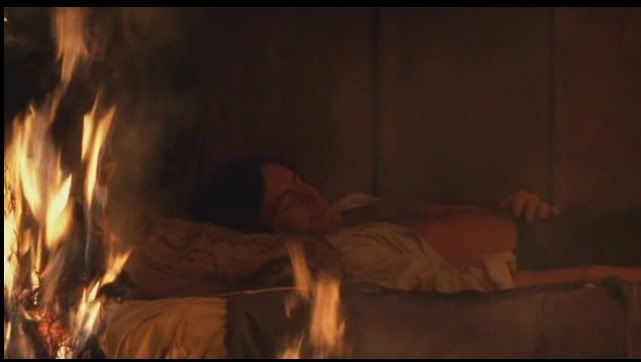
Posted by
Brontëana
at
8:46 p.m.
19
comments
![]()
Labels: jane eyre, jane eyre 2006
My Nightmare Come True
It sounds a lot worse than it really is, and yet the subject line is literally true. The first episode of Jane Eyre is absolutely everywhere, and so I have seen it personally. Last week or so I had a nightmare that it would have a Star Wars scene in it (this is entirely my friend's fault. She saw one of the preview clips, then showed me a British comic making fun of Brits in movies including Star Wars). I jotted my impressions down. Twice I was reminded of Star Wars, and once of The Great Escape. Possibly Master and Commander as well, very seldom reminded of Jane Eyre.
Now, for a few screencaps from the first half of the first episode: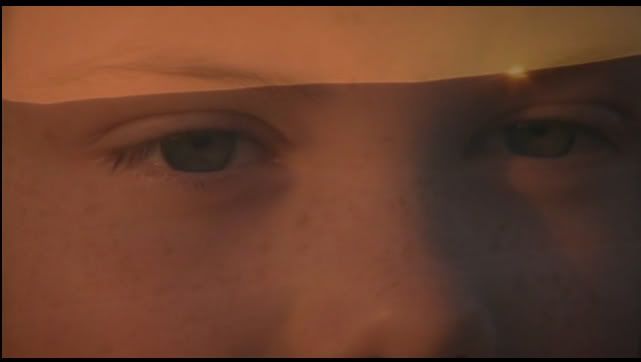
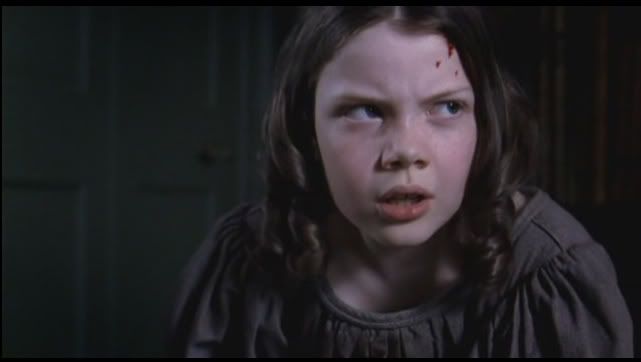
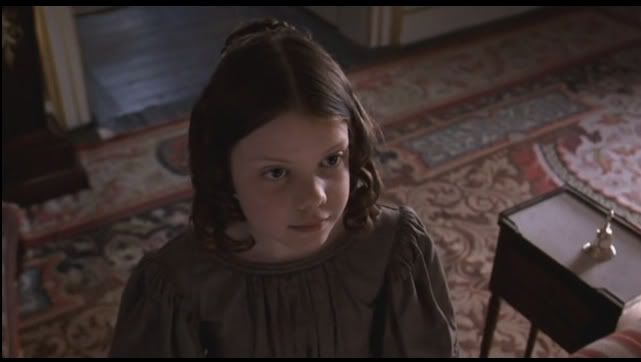

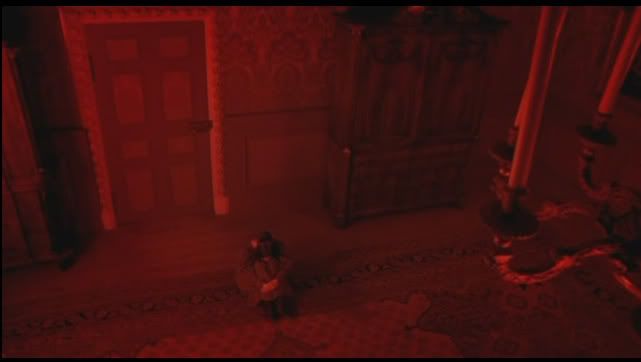
But this one is my favourite (I did not caption it. That is the subtitle). Click to see it full sized:
Posted by
Brontëana
at
4:05 p.m.
17
comments
![]()
Labels: jane eyre, jane eyre 2006
Sunday, September 24, 2006
The Reviews of Jane Eyre 2006
Well, the first professional reviews are coming in now. And the response is full of backhanded approval:
After parading his ignorance for us (and writing worthy of the Edward Bulwer Lytton Prize for terrible prose, masquerading as Bronte's), the writer of this article says the first episode is 'more concerned with arresting spectacle than nuances of dialogue.' He spends the rest of it describing hair and voice tone in minute but meaningless detail and ends the drivel with: 'Jane Eyre? Rotten book for ninnies ; enjoyable telly show.' I guess for having nothing better to say than Ruth Wilson can smile and Toby Stephens can ....smile as well, he really did enjoy it somehow but he could have fooled me.
This critic was also very disappointed:
Jane Eyre has a classic first-person narrator problem. The heroine is isolated and without a confidante. She can only pour her heart out on to the page. But what's she to do on TV? Voiceover is the obvious answer, but there seems to be an anti-voiceover fashion on TV just now. Certainly this adaptation has not solved the problem. Ruth Wilson, as any actor would, struggled to find ways of showing what was going on in Jane's mind. Charlotte Brontë's narrating voice in the novel helps one buy into the horse accidents, burning beds and mad maids in the corridor but, stripped of that voice, these incidents came over as the redundant plot furniture of gothic melodrama.
For all her love of Thackeray Brontë is not a great satirist and the crude writing and acting around the snobs was so ridiculous I longed for Jane to take the piss as adeptly as *Pride and Prejudice's Elizabeth Bennet would have. Francesca Annis brings a lot of stature to her snob, but no matter how much presence and restraint actors may have it does seem to be very difficult for them to resist the cliches of English period acting. Rochester's complexity comes over as a bit artful in Toby Stephens's hands. He is so changeable and his performance is like one of those token Sloanes who sometimes stroll into *Big Brother to become the victim of an entire nation's class resentment. Bad enough that Jane comes over as a morbid bore but add his Rochester and you're questioning why he's posing her a dilemma at all.
And I think this critic is seriously disturbed- oh the strange imagery!
The BBC’s Jane, on the other hand, is one hot 19th-century governess. She looks like a chick in a Magnum ice-cream advert. She’s got flawless skin, tumbling hair, perfectly sculpted eyebrows and a frankly extraordinary upper lip: a fleshy, kissable duckbill, which appears to vibrate lasciviously in moments of high emotion.
However — and thankfully for the auspices of the rest of the series — Ruth Wilson’s beauty isn’t being made into a big issue. She isn’t going around being beautiful, if you know what I mean. She sits very quietly, and with a cautious stillness — as, indeed, would someone who’d spent most of their life in an evangelical Christian orphanage run by emotional sadists, and then suddenly found themselves living in a castle with a wolf, a sex-case and a mental.
Toby Stephens’s Rochester, meanwhile, while definitely not as tall as Rochester should be — he borders on Titchester, to be frank — is doing well as a sex-case living with a wolf and a mental. There’s a vulcanicity to him. He strikes you as an entity with hot, steaming vents on his lower flanks — even though, on unhappy occasion, his hair does fatally recall Hugh Grant in Four Weddings and a Funeral.
Vents? For what? Nevermind. I really don't want to know.
Posted by
Brontëana
at
10:14 p.m.
8
comments
![]()
Labels: adaptation, articles, BBC, charlotte bronte, jane eyre, jane eyre 2006
Three New Clips from Jane Eyre: The Musical
Thanks to bellalafea, here is 'Forgiveness' with Jayne Paterson (Jane Eyre understudy) as Helen Burns, and the Finale of the show in two parts (with Marla Schaffel as Jane Eyre and James Barbour as Mr Rochester).
Posted by
Brontëana
at
6:17 p.m.
2
comments
![]()
Labels: jane eyre, jane eyre 2006, jane eyre the musical, media
Preview Clip from Episode Two
Here's a very brief post about an addition to the BBC's website for the new Jane Eyre. The preview clip for episode two is already available. I couldn't find it, but Thisbeciel sent me the tip. So here it is.
It is nice to see that there are tons of blog posts from people who intend to be watching tonight. And it's a little funny to see how many are skeptical- STILL- that it even exists. Really, I have been doing my best since December to get the news around but people are still going to watch this expecting to see Timothy Dalton and Zelah Clarke. I'm not kidding. They even speak of others assuring them that this is new, but they will not believe it until they see it with their own eyes! Ah well.
ETA: I've made some screencaps of the preview clip:




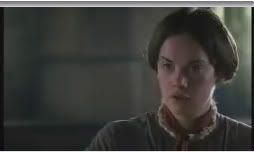
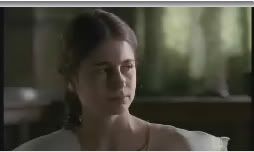
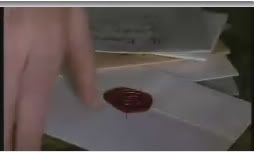
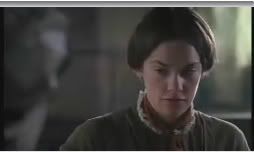
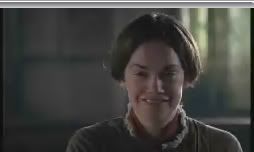
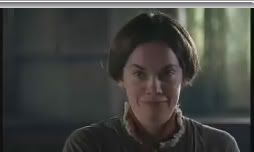
Posted by
Brontëana
at
1:16 p.m.
3
comments
![]()
Labels: BBC, blogs, jane eyre, jane eyre 1982, jane eyre 2006
The Full Bronte
That is the title of this article from The Sunday Herald, examining the eternal question of how the Brontes wrote their novels (why, with ink of course...).
TH AT Charlotte and Emily Bronte produced two of the greatest romantic novels ever written without – to anyone’s knowledge – ever having had sex is a fact that has astonished and titillated onlookers for a very long time. Back in 1853, the novelist William Thackeray patronisingly surmised that Charlotte was a “naive” woman so eaten up with frustration that she would have preferred sex to literary success, only she was too ugly to get a man. “Rather than have fame,” he wrote, “she wants some Tomkins or another to love her and be in love with. But you see she is a little bit of a creature without a penny worth of good looks, 30 years old I should think, buried in the country, and eating her own heart up there, and no Tomkins will come.”
[...]
All of the Bronte sisters shocked Victorian society with their very different novels, but did it matter that they were virgins when they wrote them? Interestingly, during the 19th and early 20th centuries not only misogynists like Thackeray but feminists too seem to have had an undue interest in the Brontes’ non-existent sex lives. Where Thackeray looked down on Charlotte as a sex-starved spinster , the feminist writer May Sinclair worshipped her as a “virgin priestess of art”, and was devastated to discover that her idol had fallen, all too humanly, in love with a married man.
This is all par for the course but still interesting. However, I was amused by the description of Jane Eyre being 'set in the Regency period'! It looks like we still can't agree on this.
Incidentally, this has nothing to do with the article but everything to do with the title: 'the Full Bronte' has a special meaning for anyone who has taken a look at the articles written about the Gordon/Caird musical of Jane Eyre. At the end of one fateful interview with their leading man, in a comically desperate moment to get those modern folk interested in the story (which we see is still the dominant motivation for today's adaptations), the actor added: "I don't want to sound wrong but there's a lot of beautiful women in this show. And we all get naked at the end. No one seems to know that. Yeah, the Full Bronte!"
Posted by
Brontëana
at
11:20 a.m.
6
comments
![]()
Labels: articles, bronte society, charlotte bronte, emily bronte, interviews, jane eyre, jane eyre 2006, jane eyre the musical, john caird, paul gordon
Saturday, September 23, 2006
Posted by
Brontëana
at
12:46 p.m.
1 comments
![]()
Labels: jane eyre, jane eyre 2006
Posted by
Brontëana
at
8:33 a.m.
0
comments
![]()
Labels: articles, jane eyre, jane eyre 2006
Posted by
Brontëana
at
8:29 a.m.
2
comments
![]()
Labels: articles, jane eyre, jane eyre 2006
Friday, September 22, 2006
Rochester: 'The sex is of no interest to me whatsoever'
Taking lines out of context is a lot of fun. I've had confirmation today that I picked the right school. I've 'begun' 'work' on my thesis on adaptations of Jane Eyre and am finding Jane Eyre and What Adaptors Have Done to Her to be a lot of fun. A little thin on criticism, but the quotations are excellent- and often totally hilarious. It begins with a fabulous quote from a theatre review in which they express astonishment that there is no 'National Society for the Suppression of Plays about the Brontes.' Talk about harsh! I love it. Anyway, she goes on to say that the BBC crushed her dreams and so she's not going to play with them but stick to Victorian stage adaptations and two American films (so there!).
The Victorian plays are awesome. I have one linked on the sidebar- the 1857 Brougham one, which includes happy dancing farmers at the end, tons of 'snubbed, by Jove!,' Grace Poole's cake addiction and one 'dem rhinoceros!' (The illustration from the script also shows Mr Rochester flying through the air). To this must now be added some extraordinary lengths to make the story happier (Jane has only just told Rochester that his infirmities 'are none to me, sir' when- poof! he can see again! This reminds me of a blog entry I read recently where someone complained that Rochester's hand doesn't grow back and he doesn't get 'pretty'. If his eye can grow back at a word from Jane, I can't see the trouble with the hand and a perm).
Two of my favourite moments come from the same play. Goes a little something like this:
Brocklehurst: Ew, who's that smelly tramp?
Rochester: Oh, the hurting off stage and the pain!
Brocklehurst: Let us do the Christian thing and flee the smelly tramp! *leaves*
Rochester: SNARKSNARKSNARK blast it. SNARK
Jane: Oh, snarking. Can I help?
Rochester: You ma fairy womans! Give me a hankee and lift me to safety.
Jane: ...O...kay. Uhm. There.
Brocklehurst: Did you just lift that smelly tramp with a handkerchief? You are so FIRED!Rochester: No, she's hired. I need a governess. Here's my phone number. See you are 9. *clicks*
John Reed: All your inheritance are belong to me! Ha ha!
Jane: Noooo!
Rochester: *whips off his bandages and snatches the inheritance papers*
John Reed: Blast! It cannot be! He sees!
Rochester: I will now pronounce a very long speech about blindness touching mostly upon the blindness in not realising the love of a certain little lady in the crowd today-
Jane: Oh, that's me! I love you!
Rochester: Yes, I was blind but not blind to see ma woman's inheritance stolen!
Jane: ...Hey, you can see!
Rochester: ...Yes. Sorry, I was just pretending.
One last thing. From yet another adaptation comes this complete 'whitewashing' of Rochester's character. It would also be quite a stupendous cover story... Once upon a time Edward loved 'Henrietta' but while he went to London, she married his elder brother 'Arthur.' Edward was going to protest but they had him declared mad, tied up, knocked out and put on a ship to the West Indies. Time passes, everyone dies, so he returns home to find a note from his brother. His brother explains that Henrietta quickly came to hate him, she took a lover, gave birth to Adele. He killed the lover, and had Adele taken from her, so she went mad and he died of guilt- or something. Anyway, Edward is now supposed to hush up Henrietta and raise Adele. Aw... (I couldn't help but think this is too much like: 'It isn't my fault, Jane! I was kidnapped by pirates!')
Okay, one last last thing. The Bronte section here is at least twice the size of the one at my old university and it has bound editions of Transactions of the Bronte Society going back to the 1890s (they all look so cute in their sideburns and cravats for those member portraits! The Victorian editions are in facimile). So guess what I will be doing this weekend! If only I had a scanner... some the material is entirely new to me (including an un-finished novel by Charlotte called 'Ashworth.')
Posted by
Brontëana
at
9:55 p.m.
8
comments
![]()
Labels: adaptation, BBC, blogs, bronte society, charlotte bronte, films, illustrations, jane eyre, jane eyre 2006
ES Magazine Article on Jane Eyre 2006 and Ruth Wilson
The second half, devoted to Toby Stephens to come shortly. Thanks again Penny! What would we do without you?
Posted by
Brontëana
at
6:00 p.m.
1 comments
![]()
Labels: articles, jane eyre, jane eyre 2006
